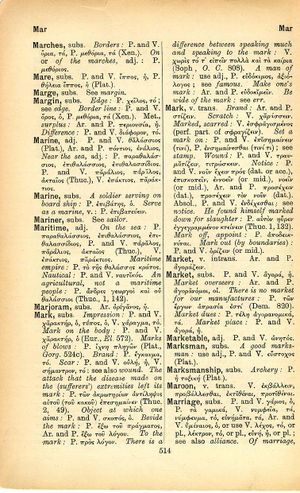mark: Difference between revisions
οὐκ ἔστι λύπης ἄλγημα μεῖζον → there is no greater pain than grief
(CSV4) |
m (Woodhouse1 replacement) |
||
| Line 1: | Line 1: | ||
{{Woodhouse1 | {{Woodhouse1 | ||
|Text=[[File:woodhouse_514.jpg|thumb|link={{filepath:woodhouse_514.jpg}}]] | |Text=[[File:woodhouse_514.jpg|thumb|link={{filepath:woodhouse_514.jpg}}]] | ||
===substantive=== | |||
[[impression]]: [[prose|P.]] and [[verse|V.]] [[χαρακτήρ]], ὁ, [[τύπος]], ὁ, [[verse|V.]] [[χάραγμα]], τό. | |||
[[mark on the body]]: [[prose|P.]] and [[verse|V.]] [[χαρακτήρ]], ὁ ([[Euripides|Eur.]], ''[[Electra]]'' 572). | |||
[[marks of blows]]: [[prose|P.]] [[ἴχνη πληγῶν]] ([[Plato]], ''[[Gorgias]]'' 524C). | |||
[[brand]]: [[prose|P.]] [[ἔγκαυμα]], τό. | |||
[[scar]]: [[prose|P.]] and [[verse|V.]] [[οὐλή]], ἡ, [[verse|V.]] [[σήμαντρον]], τό:see also [[wound]]. | |||
[[the attack that the disease made on the]] ([[sufferers]]) [[extremities left its mark]]: [[prose|P.]] [[τῶν ἀκρωτηρίων ἀντίληψις αὐτοῦ]] ([[τοῦ κακοῦ]]) [[ἐπεσημαίνεν]] ([[Thucydides|Thuc.]] 2, 49). | |||
[[object at which one aims]]: [[prose|P.]] and [[verse|V.]] [[σκοπός]], ὁ. | |||
[[beside the mark]]: [[prose|P.]] [[ἔξω τοῦ πράγματος]], [[Aristophanes|Ar.]] and [[prose|P.]] [[ἔξω τοῦ λόγου]]. | |||
[[to the mark]]: [[prose|P.]] [[πρὸς λόγον]]. | |||
[[there is a difference between speaking much and speaking to the mark]]: [[verse|V.]] χωρὶς τό τ' εἰπεῖν πολλὰ καὶ τὰ καίρια ([[Sophocles|Soph.]], ''[[Oedipus Coloneus]]'' 808). | |||
[[a man of mark]]: use adj., [[prose|P.]] [[εὐδόκιμος]], [[ἀξιόλογος]]; see [[famous]]. | |||
[[make one's mark]]: [[Aristophanes|Ar.]] and [[prose|P.]] [[εὐδοκιμεῖν]]. | |||
[[be wide of the mark]]: see [[err]]. | |||
===verb transitive=== | |||
[[brand]]: [[Aristophanes|Ar.]] and [[prose|P.]] [[στίζειν]]. | |||
[[scratch]]: [[verse|V.]] [[χαράσσειν]]. | |||
[[marked]], [[scarred]]: [[verse|V.]] [[ἐσφραγισμένος]] (perf. part. of [[σφραγίζειν]]). | |||
[[set a mark on]]: [[prose|P.]] and [[verse|V.]] [[ἐπισημαίνειν]] ([[τινί]]), [[prose|P.]] [[ἐνσημαίνεσθαι]] ([[τινί]] τι); see [[stamp]]. | |||
[[wound]]: [[prose|P.]] and [[verse|V.]] [[τραυματίζειν]], [[τιτρώσκειν]]. | |||
[[notice]]: [[prose|P.]] and [[verse|V.]] [[νοῦν ἔχειν πρός]] (dat. or acc.), [[ἐπισκοπεῖν]], [[ἐννοεῖν]] (or mid.), [[νοεῖν]] (or mid.), [[Aristophanes|Ar.]] and [[prose|P.]] [[προσέχειν]] (dat.), [[προσέχειν τὸν νοῦν]] (dat.). Absol.. [[prose|P.]] and [[verse|V.]] [[ἐνδέχεσθαι]]; see [[notice]]. | |||
[[he found himself marked down for slaughter]]: [[prose|P.]] [[αὑτὸν ηὗρεν ἐγγεγραμμένον κτείνειν]] ([[Thucydides|Thuc.]] 1, 132). | |||
[[mark off]], [[appoint]]: [[prose|P.]] [[ἀποδεικνύναι]]. | |||
[[mark out]] ([[by boundaries]]): [[prose|P.]] and [[verse|V.]] [[ὁρίζειν]] (or mid.). | |||
}} | }} | ||
Revision as of 08:49, 20 May 2020
English > Greek (Woodhouse)
substantive
impression: P. and V. χαρακτήρ, ὁ, τύπος, ὁ, V. χάραγμα, τό.
mark on the body: P. and V. χαρακτήρ, ὁ (Eur., Electra 572).
marks of blows: P. ἴχνη πληγῶν (Plato, Gorgias 524C).
scar: P. and V. οὐλή, ἡ, V. σήμαντρον, τό:see also wound.
the attack that the disease made on the (sufferers) extremities left its mark: P. τῶν ἀκρωτηρίων ἀντίληψις αὐτοῦ (τοῦ κακοῦ) ἐπεσημαίνεν (Thuc. 2, 49).
object at which one aims: P. and V. σκοπός, ὁ.
beside the mark: P. ἔξω τοῦ πράγματος, Ar. and P. ἔξω τοῦ λόγου.
there is a difference between speaking much and speaking to the mark: V. χωρὶς τό τ' εἰπεῖν πολλὰ καὶ τὰ καίρια (Soph., Oedipus Coloneus 808).
a man of mark: use adj., P. εὐδόκιμος, ἀξιόλογος; see famous.
make one's mark: Ar. and P. εὐδοκιμεῖν.
be wide of the mark: see err.
verb transitive
marked, scarred: V. ἐσφραγισμένος (perf. part. of σφραγίζειν).
set a mark on: P. and V. ἐπισημαίνειν (τινί), P. ἐνσημαίνεσθαι (τινί τι); see stamp.
wound: P. and V. τραυματίζειν, τιτρώσκειν.
notice: P. and V. νοῦν ἔχειν πρός (dat. or acc.), ἐπισκοπεῖν, ἐννοεῖν (or mid.), νοεῖν (or mid.), Ar. and P. προσέχειν (dat.), προσέχειν τὸν νοῦν (dat.). Absol.. P. and V. ἐνδέχεσθαι; see notice.
he found himself marked down for slaughter: P. αὑτὸν ηὗρεν ἐγγεγραμμένον κτείνειν (Thuc. 1, 132).
mark off, appoint: P. ἀποδεικνύναι.
mark out (by boundaries): P. and V. ὁρίζειν (or mid.).

